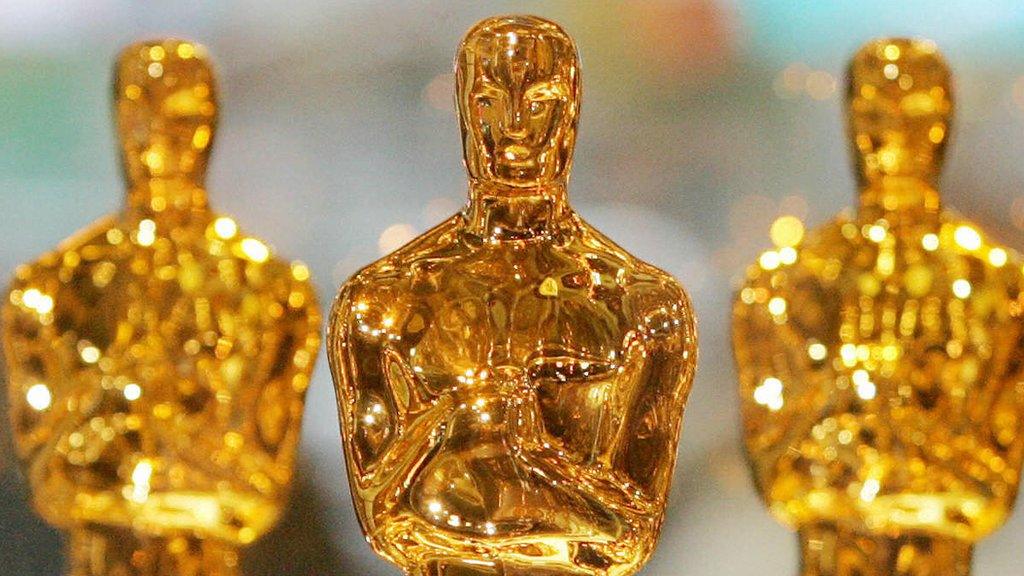Lily Gladstone: The Native American actress who could make Oscars history
- Published
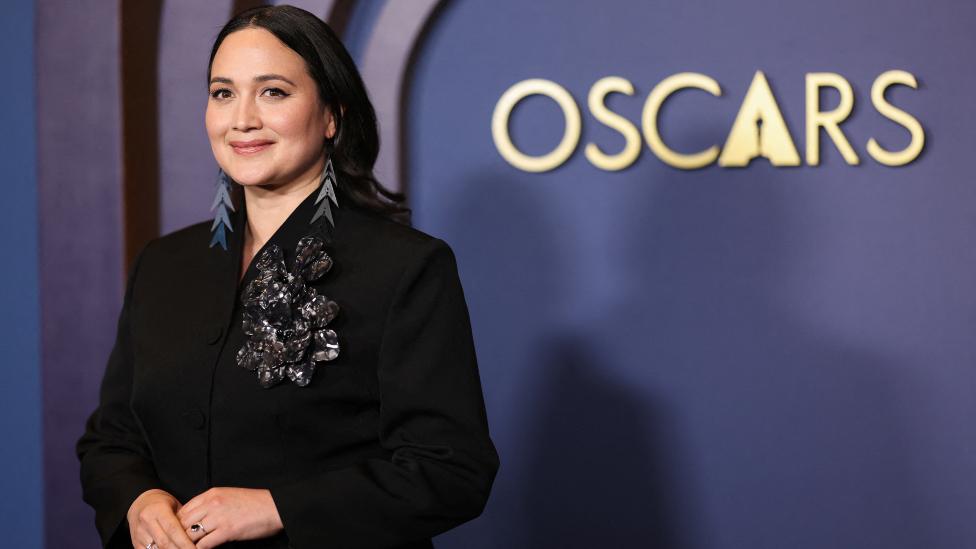
Lily Gladstone is seen as one of the frontrunners to win best actress, alongside Poor Things star Emma Stone
Lily Gladstone has already made Academy Awards history, and she could be about to make it again.
The 37-year-old is the first Native American woman to ever be nominated for best actress at the Oscars. We will find out if she is also the first winner when the ceremony takes place in Los Angeles on 10 March.
Gladstone is not a newcomer to acting - viewers may have seen her in TV series such as Billions and films including Certain Women.
But she was not a household name until she appeared in Killers of the Flower Moon - a three and a half-hour epic directed by Martin Scorsese.
The actress points out being the first Native American best actress nominee at the Oscars after 96 years feels long overdue considering what's known about the origin of cinema.
"Some of the very first films, I think the very first film, was of Native people," she tells the BBC's culture and media editor Katie Razzall. "It was us filming ourselves and documenting some of our dances.
"That's some of the very earliest archival film footage. The first movie, I think, was made by Native people. So I'm grateful [for the Oscar nomination], it's about time."
She has already won a Golden Globe for her role. "It's circumstantial that I was the first one to win that in the category, but it doesn't belong to me," she says. "I'm standing on so many shoulders and I'm representing such a huge supportive community that's made it possible for me to do this."
Gladstone isn't the first indigenous performer to be nominated for best actress - Whale Rider's Keisha Castle-Hughes and Roma's Yalitza Aparicio preceded her. But Gladstone is the first from the US.
She is a strong contender for the Oscar, but her win is far from certain - there is competition from Poor Things star Emma Stone, who is currently seen as co-frontrunner.
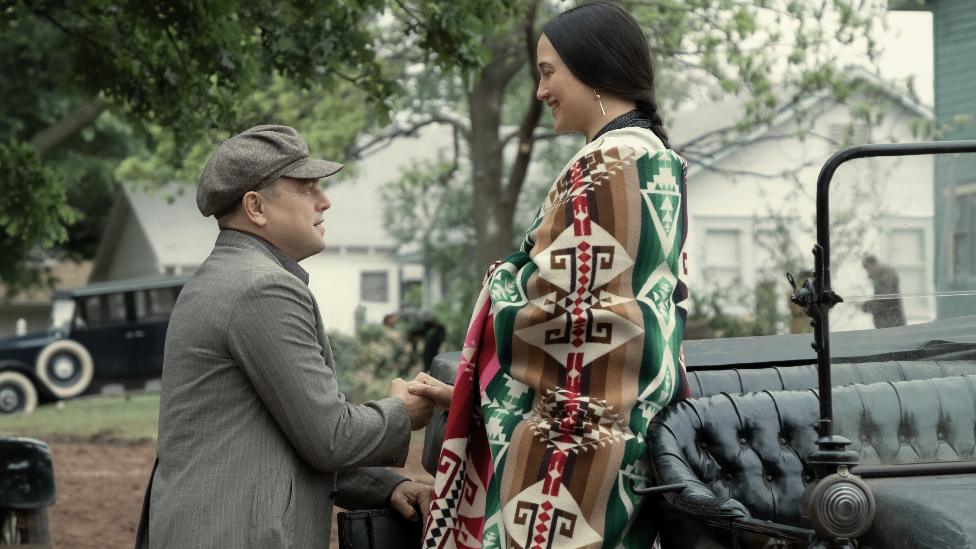
Gladstone's co-star Leonardo DiCaprio congratulated her on being Oscar nominated last week
Gladstone was born on 2 August 1986 in Kalispell, Montana and lived on the Blackfeet Indian Reservation in the western US state.
She was keen on acting from the age of five - deciding she wanted to play an Ewok after watching Return of the Jedi and "loving the concept of living in tree houses".
"My path to acting started with watching a lot of movies, because I grew up in a very rural place, that was snowed in for a good part of the year," she recalled in an interview in 2020., external
"The first time I realised that acting was an option was when I really wanted to grow up to be an Ewok - I loved that life, was all about it, but was also old enough to realise that it's fantasy. So if I wanted that life, I could become an actor."
Gladstone started appearing in local productions and continued acting throughout her youth, playing an evil step-sister in a children's theatre production of Cinderella.
"I was a nerd. But I was a popular nerd," Gladstone tells the BBC of her school days. "A nerd in the sense that I had a social life with a few close friends, but I was chronically like, 'Sorry, I can't, I'm in rehearsal'."
Her friends may not have seen much of her - but they recognised her potential. In her yearbook, Gladstone was voted, external "most likely to win an Oscar" by her classmates.
She made her feature film debut in 2012's Jimmy P: Psychotherapy of a Plains Indian, which starred Benicio del Toro. Roles followed in Winter in the Blood and Buster's Mal Heart, opposite Rami Malek.
But it was her role as rancher Jamie in 2016's Certain Women which provided Gladstone's big break, winning her the best supporting actress prize with film critics' groups in Los Angeles and Boston.
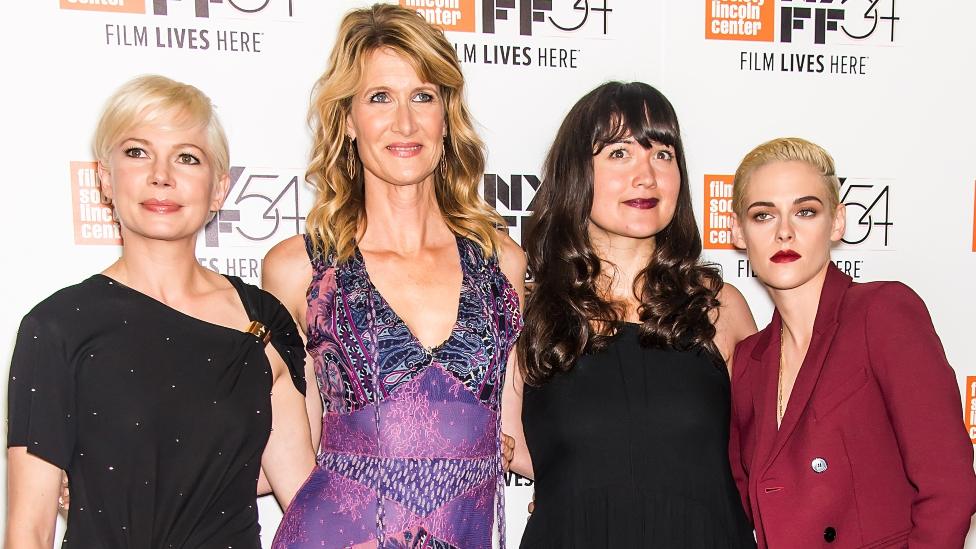
Certain Women stars (left to right) Michelle Williams, Laura Dern, Gladstone and Kristen Stewart pictured in 2016
Around this time, Martin Scorsese had become attached to a screen adaptation, external of David Grann's Killers of the Flower Moon - a book which told the true story of the murders of Osage people in Oklahoma in the early 1920s.
Driven by greed, white settlers hatched a plan to marry into wealthy Osage families, while murdering tribe members who stood to inherit great wealth, in an effort to benefit from the oil on their land.
Gladstone was cast as the Osage woman at the centre of the story, Mollie Kyle. The Guardian's Wendy Ide described the actress, external as "magnetic" in the role.
"Gladstone is magnificent here," she wrote. "Mollie is a point of stillness in a frame bursting with swagger and noise. Her serene composure draws the eye; her quiet strength holds it."
The actress is the "star of the show", agreed the Evening Standard's Hamis Macbain,, external "taking by far the most interesting, conflicted character and turning in a performance of aloof, understated brilliance".
Discussing her portrayal of Mollie, Gladstone says: "I was very much instructed and guided by the community. [They said] Osage woman carried themselves like the royal family."
Much like Gladstone herself, Mollie carries herself with grace and speaks in a subdued tone of voice - bring a sense of reserved serenity to the character at the centre of the story.
As acclaim for her performance grew, Gladstone used her rising profile to shine a light on the community that had raised her. She began her Golden Globe acceptance speech by speaking Blackfeet,, external something she was widely applauded for.
The actress tells BBC News the words she spoke were the traditional introduction within her community. "I said, 'Hello, my friends. My name is Eagle woman. It's a name I was given when I was 16. I come from the Blackfoot speaking people from the Blackfeet Nation'."
Reflecting on her speech now, she adds: "It's incredible how profound the impact has been for my community."
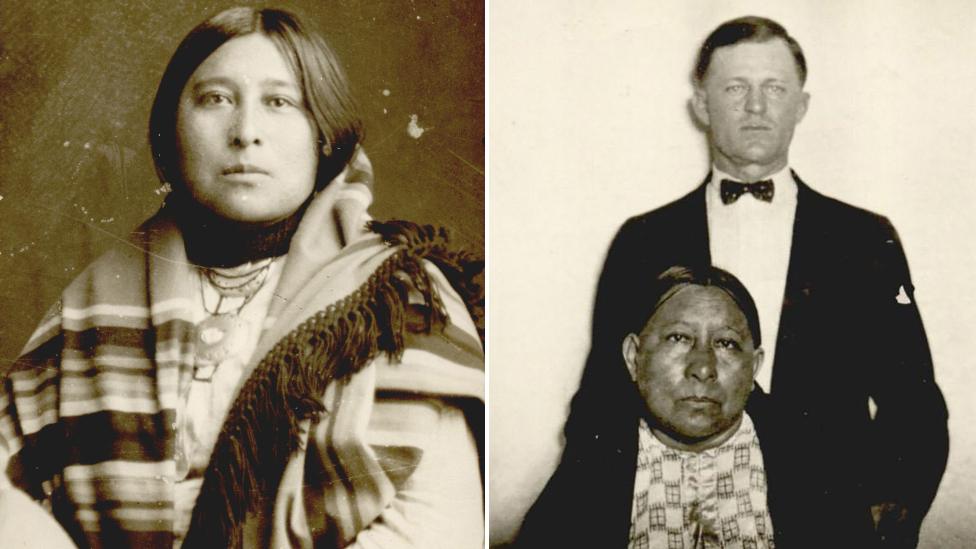
Mollie Burkhart, pictured right with husband Ernest, in Killers of the Flower Moon (picture dates unknown)
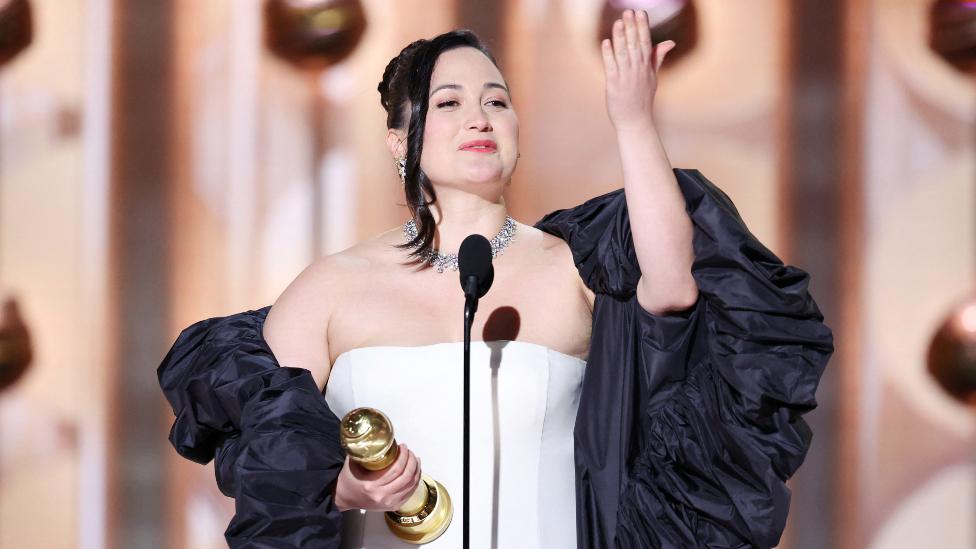
Gladstone began her Golden Globes acceptance speech by speaking Blackfeet
Gladstone also used her speech to highlight the way Hollywood used to represent her community on screen., external
"Native actors used to speak their lines in English, and then their sound mixers would run them backwards to accomplish Native languages on camera," she said.
Attitudes towards Native American actors have come a long way since then, but Gladstone has still had to battle prejudice.
While part of a theatre programme in Montana, she and her classmates had to prepare an audition for every show scheduled for that semester.
"When I saw that one of the shows was JM Barrie's Peter Pan, my heart sank," Gladstone recalled in 2019., external "In Indian country, Peter Pan is regarded as very racist.
"Some of my classmates thought I was a shoe-in for Tigerlily. Tigerlily is a red-faced character who lives in Never Never land, whose only lines are 'ugh-ugh-wah'. I wanted nothing to do with it."
After a journalist friend covered her protestations as a news story, Gladstone sensed that staff were unhappy that she had upset the apple cart. "They did rewrite the Indians as generic natives of Neverland, and cut the 'ugh-ugh-wah' lines, but it was still insensitive," she said.
Today, Gladstone says she wonders if being so vocal cost her future roles and relationships at the college.
"After that, I remember I got to understudy bits," she recalls. "I was always getting really high marks and classwork for my scene work. I was getting very praised for everything I was doing in class. But it was so rare I get put on stage, and I always kind of wonder if it was a remnant from that first moment."
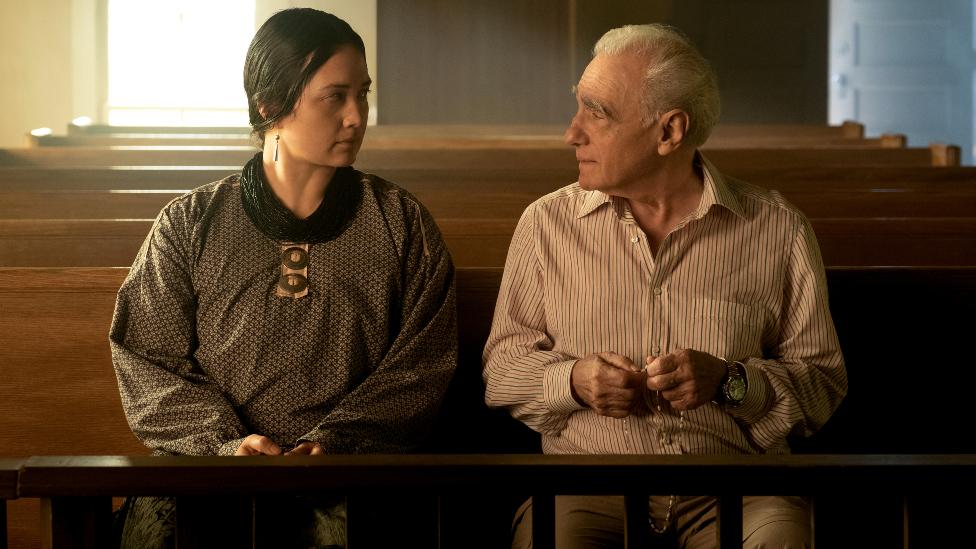
Killers of the Flower Moon was directed by Martin Scorsese, whose other films include Taxi Driver and The Departed
Killers of the Flower Moon started out with what's been described as a "white saviour" narrative - focusing more on the FBI investigation into the murders rather than the story of the Osage people themselves. The narrative evolved thanks to the contributions of Osage people.
"It would have been like a lot of compromising situations that Native actors find themselves in," Gladstone says, "where you sign up for something because you need the work and you just really hope that you're able to elevate it.
"But with this, it was incredible. Every aspect of the whole script changed because of Osage contribution to it and was made the better for it."
So what's next for Gladstone? She is set to star in sci-fi film Memory Police, which will see her reunite with executive producer Scorsese. But she acknowledges that, after some heavy projects, she is ready for something lighter.
"I do find that any piece that I do does tend to revolve around these big questions of imperialism, authoritarianism, indigeneity; of love, of family and humanity." But, she laughs: "I also feel like I'm very due for a comedy at this point."
Related topics
- Published8 January 2024
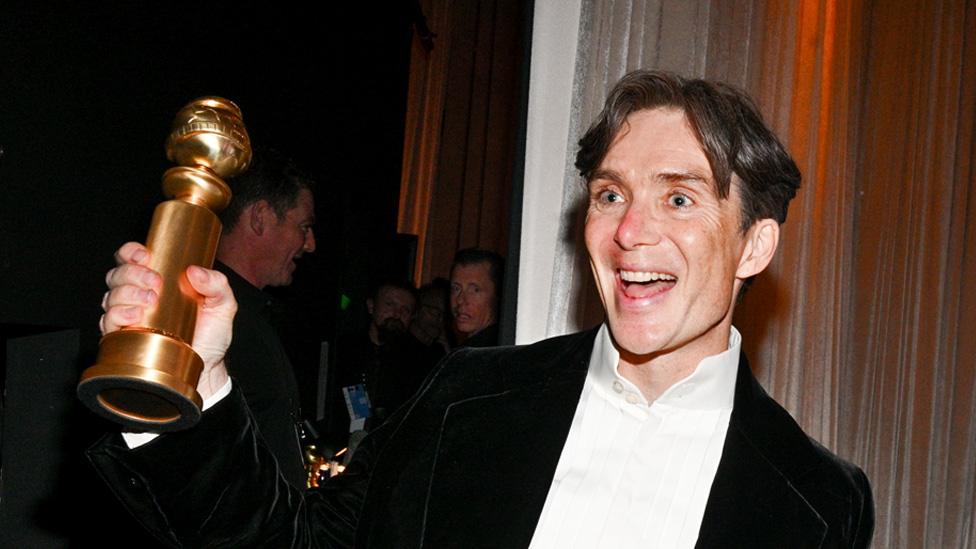
- Published23 January 2024
